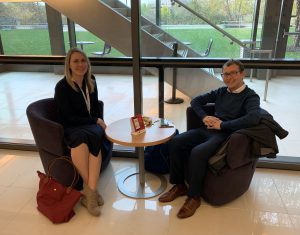Learning from the US cancer detection experience
 Stephen Bradley, a GP and CanTest research fellow at the University of Leeds, recently travelled to Washington DC to learn about research and policy in the United States around cancer detection.
Stephen Bradley, a GP and CanTest research fellow at the University of Leeds, recently travelled to Washington DC to learn about research and policy in the United States around cancer detection.
As well as my research on lung cancer diagnosis in the UK, I’ve long been interested in what we can learn from research in other countries which share similar challenges in improving cancer outcomes.
While attending the CanTest International School in cancer detection I was lucky to meet colleagues from the United States, including Elizabeth Sarma from the National Cancer Institute and Ashley Meyer from the Baylor College of Medicine & Veterans’ Administration. The generous award of a CanTest Travel Fellowship allowed me to call on these contacts to arrange a visit to the United States to learn about cancer detection and health care in America.
The fellowship involved many fascinating meetings with cancer researchers. At the University of Pennsylvania Dr Katharine Rendle very kindly took the time to discuss her work on the PROSPR Lung Research Center, an ambitious programme funded by the National Institutes of Health to collate lung cancer screening data from different healthcare systems across the United States to analyse outcomes and improve care. At the National Cancer Institute, which is part of the United States’ National Institutes of Health, I benefited from several meetings with experts who generously shared their perspectives across cancer screening and policy as well as the nuts and bolts of undertaking research and achieving quality improvement in the United States.
I am also extremely grateful to Dr Kenneth Kizer, the former Director of the Institute for Population Health Improvement at the University of California, Davis, who shared insights in health inequalities, both in timeliness of cancer detection and quality of cancer care following diagnosis.
During the final days of the fellowship, I attended the Diagnostic Error in Medicine conference, organised by the Society for Improving Diagnosis in Medicine. With many moving accounts from patients, family members and clinicians on the devastating impacts of avoidable harms (including delayed cancer diagnosis) the collaborative determination from conference attendees to improve healthcare was deeply inspiring. Aside from provoking much reflection on my own clinical practice research, the conference had a wonderful atmosphere and I learned a great deal from those I met. A particularly unforgettable experience was accompanying some conference attendees to meet the staffs of US Representatives on Capitol Hill, to discuss issues in avoidable harms in health care.
This CanTest Travel Fellowship allowed me to learn a great deal about health care and approaches to cancer diagnosis and health inequalities in the United States. This wonderful experience has inspired me to consider how I might collaborate with international colleagues in the future. I would like to thank Dr Elizabeth Sarma from the National Cancer Institute and Dr Ashley Meyer from the Baylor College of Medicine and one of the organisers of the Diagnostic Error in Medicine Conference and all those who took the time to meet with me.


